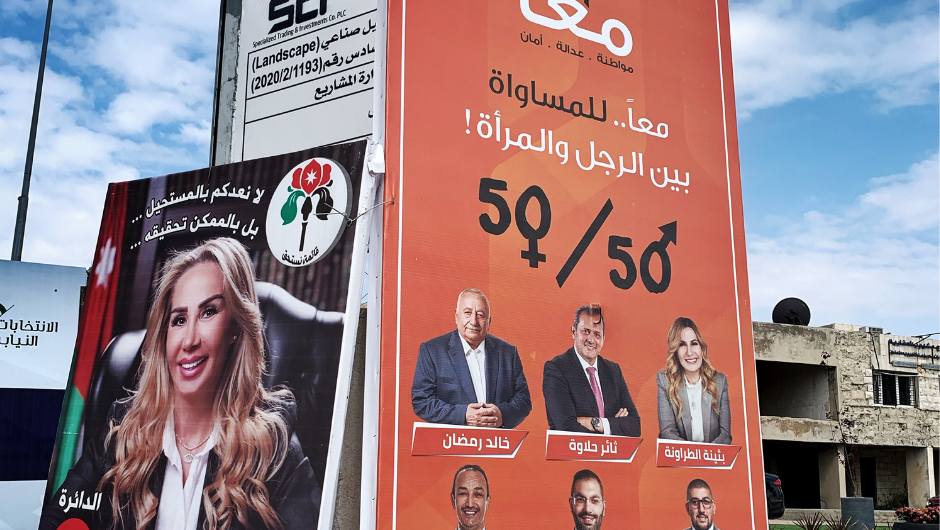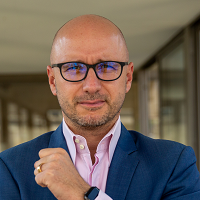MENAPOL Blog
Jordan Votes: Symbolic Ritual or Indicator of Change?

The US election campaign is just over. In Jordan it is still in full swing and at the same time reveals the differences between the two political and, above all, societal systems. Although you cannot elect your head of state in Jordan, the Jordanians have different options to cast their votes both at local / regional level and at national level. Tomorrow, Tuesday, November 10th 2020, Jordanians are now called to elect a new parliament. Of the 130 available parliamentary seats, 15 are reserved for women, 9 for Christians and 3 for Chechens and Circassians.
Bold Democracy?
1329 male and 364 female candidates are currently running for these seats, and these candidatures do not remain hidden from any citizen in Jordan. If there was a correlation between the number of election posters in public space and the democratic constitution of a country, Jordan would play in the upper democratic league. Analyses of the political symbolism show that the preparation of a parliamentary election can be designed either as a civil religious liturgy, folklore or business-like performance of duty. In Jordan, however, the complexity of political debates is countered by masses of posters and profile photos of the candidates in public spaces with slogans that are not very meaningful - such as "Education: revitalizing the country" or "The dignity of the citizen is the protection of the nation". The elections of the Jordanian parliament are thus far less political than they appear at first glance. As in Germany, the Jordanian parliament is the only directly elected constitutional body in the country and thus normatively the central democratic authority with direct legitimation by the population.
The Position and Acceptance of the Jordanian Parliament
In the collective consciousness of the population, the Chamber of Deputies has continuously lost its importance. While voter turnout has been around 50% since 1990, it fell rapidly to only 36% in the last election in 2016. There are many reasons for this: Almost none of the last governments was made up of ministers who had parliamentary experience. With approx. 80% non-party mandate holders, the current parliament is a legislative assembly of lone fighters and hardly capable of forming legislative coalitions. This has become clearly visible in the last few months. As part of the Defense Act - which has been in force to combat the corona crisis since March 2020 - the government did not need the Jordanian parliament for far-reaching decisions. Nevertheless, one rarely saw MPs discussing the supervision of government activities or commenting on the consequences of the current situation. Political parties were also not present in these talks. Against the background of a dramatic increase in COVID-19 infections, the Jordanian government also imposed strict measures that had an impact on the election campaign: Meetings of more than 20 people were prohibited and nighttime curfews and weekly lockdowns made it impossible for the candidates to attend the usual campaign tents to talk to convinced or undecided voters within a festive atmosphere, at large mass dinner parties and with the prospect of possible employment in the public service.
Corona as an Opportunity?
But not only the government, the virus itself has revealed the fragility of the Jordanian parliamentary election campaign. The focus on parliamentary lone fighters (traditionally supported by specific tribes) is far more fragile than a platform driven by political content would be. If a candidate got infected with Corona, he and his supporters are largely neutralized. In any case, far more than movements that would focus on topics rather than names or personalities would be. They could find ways and means at any time to be successful without personal contacts: A candidate can get sick, but the idea of a platform continues to find resonance. Unfortunately, nothing of this is visible in Jordan in 2020.
Like everywhere else in the world, the spread and control of COVID-19 in Jordan is a huge task and a heavy burden for the government. And here, too, there is always an opportunity hidden in every crisis. The Hashemite Kingdom has one of the youngest populations in the world: over 60% of the population are under 30 years old and in 2016 the voting age was lowered to 17 years (and 3 months) to increase the turnout. This large proportion of the population is a unique opportunity to reform yourself and break away from traditional patterns.
What Should You Watch Out for in this Election?
Even if the parliament has so far played a subordinate role in everyday political life with regards to the Royal Family and the Jordanian government, there is a possibility that this will now be questioned by the population. As mentioned, the well-tried and longstanding patterns of Jordanian election campaigns will no longer apply in 2020. A large number of new voters are not even aware of these historical processes. In the absence of personal campaign appearances, young voters have almost no choice but to find out about candidates on the internet, for example, and apply other criteria to their voting. The resulting voter turnout could be an indicator that can be used to measure the potential for reform in Jordanian society. But not only voter turnout, also targeted voting for female candidates would be such an indicator. In 2013 only 3 women were elected outside the quota system. In 2016 there were already 5. In 2020 the number of female candidates will be significantly higher than in the past. The election result will ultimately show whether Jordanian society will stick to the conservative value model or whether it will be able to provide progressive impulses beyond the set quota. Keeping this in mind is important for the Western value-community, which - like Germany - are involved in the stabilization of Jordan on a large scale. Almost 10% of the total Jordanian national budget comes from foreign aid payments, and far more capital flows into the country for humanitarian aid, education, water and infrastructure projects. Not only the Royal Court is interested in maintaining this arrangement. It is also for the benefit of the international community - and especially Germany - which strategic interests Jordan is pursuing in the region. As a country lacking natural resources, strategically located Jordan promises stability in an extremely unstable region in which the economy is collapsing and protracted wars are waged. In this crisis-ridden region, Jordan is a safe haven for economic investment and an always welcome partner for politicians from around the world. For Germany in particular - which committed itself to almost 400 million Euros in development aid for Jordan at the beginning of November 2020 - it is important to observe these delicate developments. But Europe too should have an interest in looking for more than just stability in Jordan. "Sustainable stability" is the keyword here. Sustainability is not limited to the symbolic implementation of political rituals, but in everyday political life, in which arguments are exchanged and compromises are fought for. Even if the upcoming parliament will not be able to do so, the Jordanian people may already be one step ahead.
About the Author
